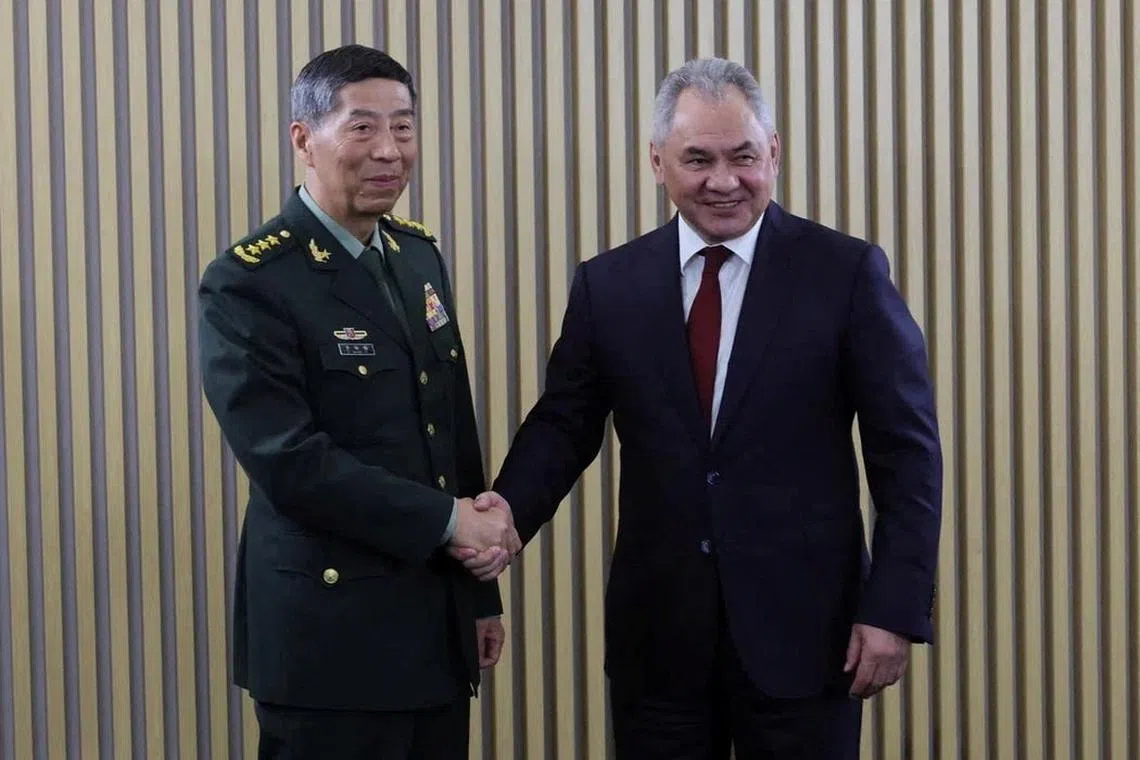News analysis
Chinese defence chief’s visit to Russia underscores ties, but also notable for what he did not say
Sign up now: Get ST's newsletters delivered to your inbox

Russia's Defence Minister Sergei Shoigu with his Chinese counterpart Li Shangfu during a meeting in the Moscow region, Russia, on Aug 15, 2023
PHOTO: REUTERS
Follow topic:
LONDON – Chinese Defence Minister Li Shangfu has wrapped up a week-long visit to Russia and Belarus,
At the same time, he also used his visit to trace the limits of his country’s military links with Russia, which – as he put it – offer an alternative security vision for the world but should not be regarded as an anti-Western alliance.
General Li’s tour coincided with a trilateral summit last Friday
Since he became defence minister in March,
His first overseas trip, in April, was also to Moscow. In total, he has met his Russian counterpart, General Sergei Shoigu, no fewer than three times.
Gen Li’s trip to Belarus last Thursday is also a diplomatic milestone since it is the first time in five years that a Chinese military chief has visited Russia’s closest European ally.
Meanwhile – apart from brief social encounters on the margins of the Shangri-La Dialogue in Singapore in June – the Chinese defence chief has rebuffed offers to officially meet his US counterpart Lloyd Austin.
Gen Li’s Moscow visit last week was also timed to coincide with Russia’s Conference on International Security, a yearly get-together staged over the past decade by the government in conjunction with an arms fair.
The event has never attracted much attention, but this year, the Russian authorities were keen to heighten its profile, and the Chinese were willing to help.
Much of Gen Li’s speech at this event consisted of predictable references to Beijing’s new Global Security Initiative (GSI), unveiled by President Xi Jinping earlier in 2023 and touted as China’s alternative to security arrangements sponsored by the West.
Gen Li hailed China’s determination “to fulfil our international obligations in building and protecting world peace”.
And in an indirect swipe at the US, he presented the GSI as an alternative to those who believe that international security should be “the exclusive privileges of individual states”, or those who seek “to restrain and suppress other countries”.
“For the sake of a safer world, we need to support each other in countering the military hegemony of those who poke into other countries’ affairs everywhere,” Gen Li said, in the most pointed remarks of his Moscow speech.
He also expressed solidarity with Russia in standing up to those who resort to “sanctions and suppression”, another criticism of Western policies.
But his speech was notable for what it did not say.
He framed China’s military partnership with Russia as part of a more global cooperative trend rather than a unique alliance, as Russian officials like to portray their links with Beijing.
“We are ready to strengthen military exchanges with the armed forces of the countries of the world, deepen military cooperation with the Asean countries and other neighbouring countries, and raise the level of military relations with European countries and the EU (European Union),” he said.
He avoided any mention of the “no-limits” friendship between Russia and China, a controversial term included in a document signed by President Xi and his Russian counterpart Vladimir Putin on the eve of Russia’s invasion of Ukraine in February 2022. Instead, Gen Li confined himself to repeating boilerplate phrases about “advancing the China-Russia comprehensive strategic cooperative partnership in the new era”.
Nor was there any mention of Chinese weapon deliveries to the Russian military, known to be short of ammunition in the Ukraine war.
China’s Xinhua state news agency said in a brief statement at the end of Gen Li’s European tour that during his time in Moscow, he “exchanged views on China-Russia ties and military-to-military ties and cooperation”, but did not elaborate.
Interestingly, it was Russian Foreign Minister Sergei Lavrov who, in his speech at the same Moscow gathering, directly appealed to China for a closer military relationship.
He accused Western countries of seeking to scrap the security architecture in the Asia-Pacific region and create a military bloc resembling the North Atlantic Treaty Organisation (Nato), the US-led military alliance in Europe.
“Having proclaimed the indivisibility of the security of the Euro-Atlantic and the Indo-Pacific region, Nato members crossed out all their previous mantra about the purely defensive nature of the alliance and officially declared that from now on, they will not only protect their territory, but will also promote their dominance in this region,” Russia’s top diplomat complained.
But Gen Li failed to respond to this clear appeal for tighter Sino-Russian cooperation.
Of course, the discussions behind closed doors between China’s and Russia’s military leaders are bound to have been very different from what was said in public – the question of Chinese munition supplies to Russia was almost certainly raised.
Yet, as Gen Li’s visit makes clear, China remains eager to prevent its close military links with Russia from restricting Beijing’s future interactions or security discussions with the US.


